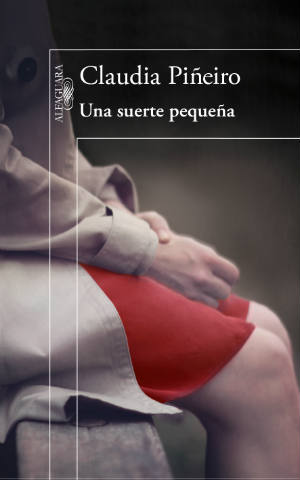 Una suerte pequeña. Claudia Piñeiro. Buenos Aires, Alfaguara. 2015. 233 pages.
Una suerte pequeña. Claudia Piñeiro. Buenos Aires, Alfaguara. 2015. 233 pages.
Claudia Piñeiro’s Una suerte pequeña [A little luck] interrogates how to narrate pain, how to give voice to our most intimate self, and, ultimately, how to live with our own reflection. Told through an almost claustrophobic first person, the novel traces a woman’s return to Buenos Aires, the city that she abandoned for mysterious reasons twenty years before. Upon her return, she is forced to stand in front of a past that she has tried to methodically obliterate, an attempt that has only tied it more closely to her identity.
The woman, who left as María, now returns as Mary and no longer resembles the young woman who fled her home country so long ago. Her hair is different; her body has morphed. Her eyes, both literally and symbolically, are the eyes of another, moving from blue to brown. She is a stranger, a foreigner, both in her home country and to herself.
Since leaving Argentina, Mary has worked as a teacher in Massachusetts, and she travels to Buenos Aires to inspect a school, although it is patently clear that her real motivation has nothing to do with her career. Instead, she is searching for the person she abandoned, whose pain she feels and whose steps her mind ceaselessly follows. The novel revolves around the guilt that she feels about her past and her view of herself as irreparably damaged. It is not simply that she cannot absolve herself, it is that she feels she has no right to justify or explain her actions; neither her silence nor her voice belong to her.
In addition to the first person narrator consumed by emotion, the novel has flashes of third person narration that hint at her past. The unfolding of the past is rhythmic and gradually transforms into Mary’s own voice as she begins to be able to tell her story. The novel is intensely personal and also intensely thrilling. The reader is submerged in the disarray of Mary’s thoughts and the horrific details of the past that she has lived with for so long. In the end, the novel is an exploration of living with guilt and still making a claim to happiness: of deserving a voice. Mary’s own process of self-reconciliation is not about forgiving herself as much as it is about abandoning the fear that she does not deserve forgiveness.
Aviva Kana
University of California, Santa Barbara





